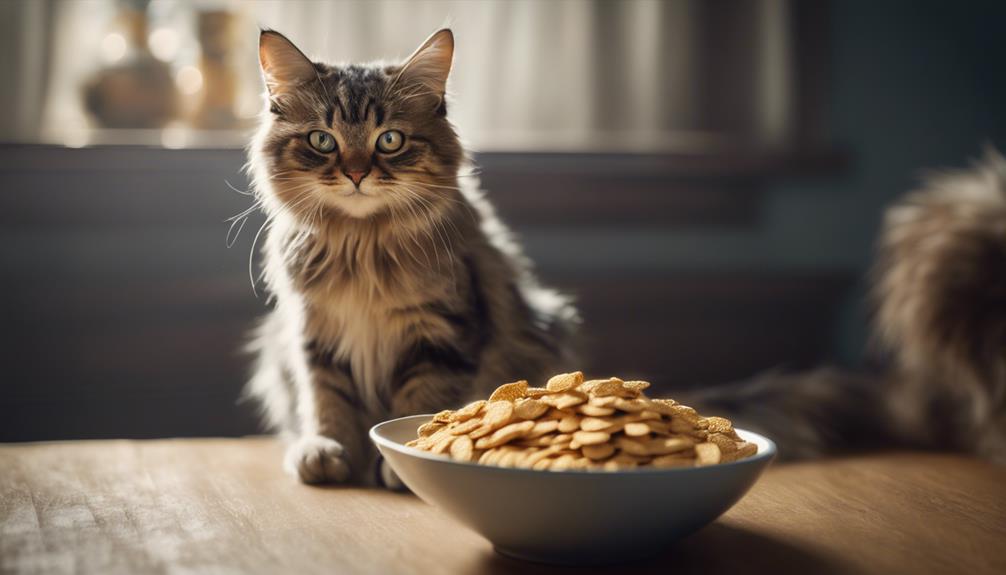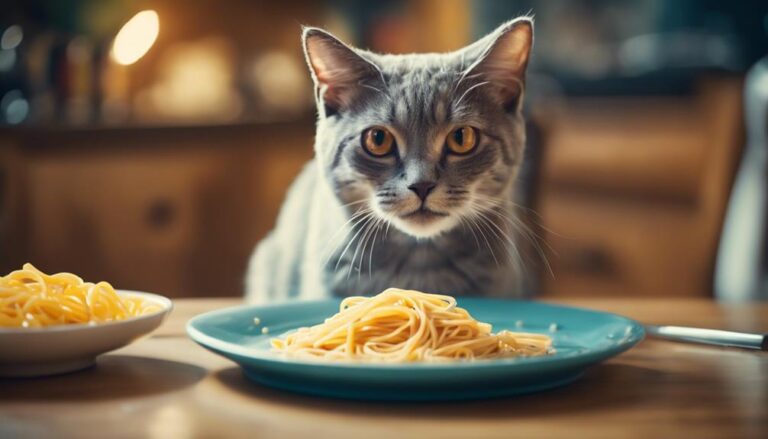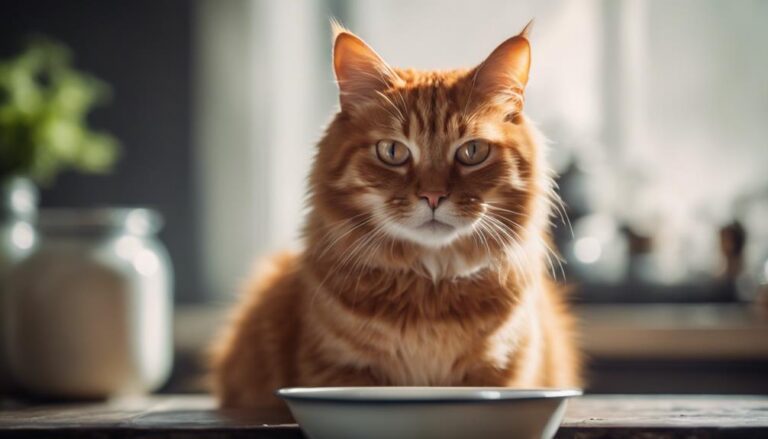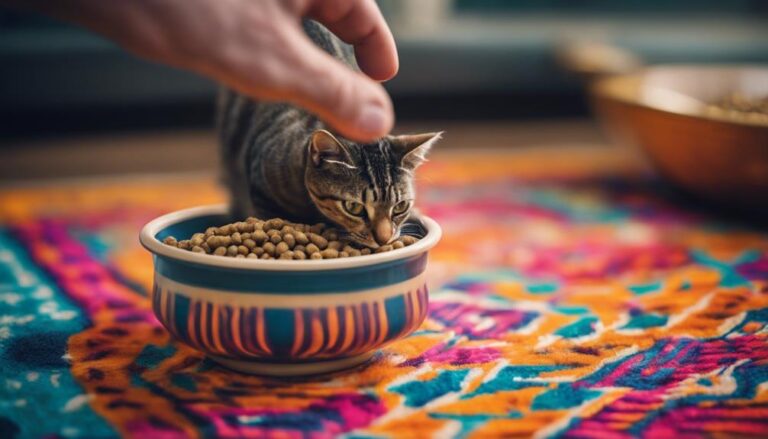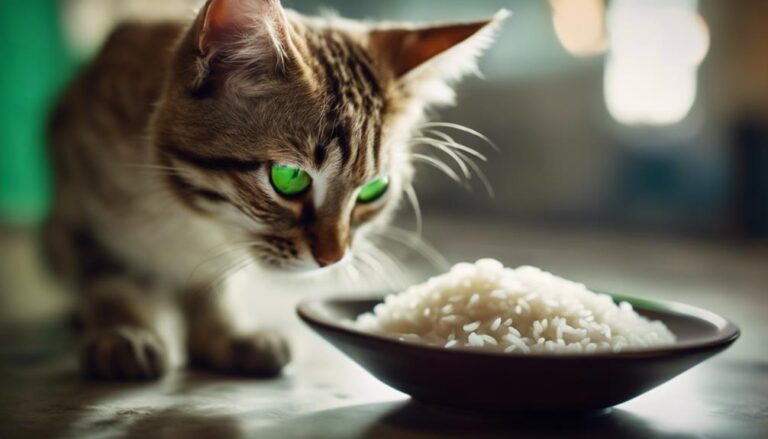If you've ever wondered about sharing your Golden Grahams with your feline friend, you might want to pause and consider their well-being first. While the urge to treat your cat can be strong, the ingredients in Golden Grahams could pose some serious risks to their health. Before making any decisions, it's crucial to understand the potential consequences of feeding these sugary cereal pieces to your cat. So, what exactly makes Golden Grahams unsuitable for your beloved pet? Stay tuned to uncover the truth behind this popular breakfast treat and its impact on your cat's diet.
Potential Risks of Feeding Golden Grahams to Cats
Feeding Golden Grahams to your cat can pose significant risks to their health. Cats are obligate carnivores, and the high sugar and carbohydrate content in Golden Grahams can lead to obesity and diabetes. These health problems can severely impact your cat's well-being.
Additionally, the artificial additives in Golden Grahams can cause digestive harm to your feline friend. Cats lack the necessary enzymes to efficiently digest the grains and processed ingredients found in Golden Grahams, further increasing the risks associated with feeding them this cereal.
Regular consumption of Golden Grahams can disrupt your cat's natural diet, leading to nutritional imbalances and digestive issues over time. These long-term health problems can be detrimental to your cat's overall health and quality of life. Therefore, it's crucial to avoid feeding Golden Grahams to your cat to prevent these potential risks and ensure they maintain a healthy and balanced diet.
Unsuitable Ingredients in Golden Grahams for Cats
You should be aware that Golden Grahams contain harmful additives that aren't suitable for your cat's well-being.
The high sugar content in Golden Grahams can lead to obesity and diabetes in cats, posing health risks.
Additionally, the artificial flavors and colors in this cereal can cause digestion issues for your feline friend.
Harmful Additives for Cats
Consuming Golden Grahams can expose your cat to harmful additives that are unsuitable for their digestive system and overall health. The ingredients in Golden Grahams, such as sugar, corn syrup, and artificial flavors, can lead to obesity, diabetes, and digestive issues in your pet.
Cats lack the necessary enzymes to properly digest the sweeteners and preservatives present in this cereal, which can disrupt their natural diet and cause nutritional deficiencies. Therefore, Golden Grahams aren't a safe or healthy snack option for your feline companion due to the toxic nature of these additives.
It's essential to prioritize your cat's well-being by avoiding feeding them foods that contain harmful ingredients like those found in Golden Grahams.
Sugar Content Concerns
The high sugar content in Golden Grahams poses a significant concern for cats' diets and overall health. Cats are prone to obesity and diabetes when exposed to excessive sugar intake, which is prevalent in foods like Golden Grahams.
Since cats lack taste receptors for sweetness, sugary treats offer no nutritional benefit and can disrupt their gut flora balance. Consuming Golden Grahams can lead to weight gain and potentially harmful health conditions in cats.
It's crucial to prioritize a feline diet that supports their specific nutritional needs and avoids ingredients like high sugar content found in cereals like Golden Grahams. Protecting your cat's health means steering clear of sugary snacks that can have detrimental effects on their well-being.
Potential Digestion Issues
Golden Grahams' unsuitable ingredients for cats, such as sugar, corn syrup, and molasses, can trigger potential digestion issues in felines. Cats lack the enzymes needed to efficiently process the high sugar content found in these graham crackers, potentially leading to digestive problems.
The high carbohydrate levels in Golden Grahams can also pose challenges for a cat's digestive system. Additionally, artificial flavors and colors present in these crackers can be harmful to a cat's health.
Cat owners should be aware that feeding Golden Grahams to their feline companions may increase the risk of obesity and diabetes due to the unhealthy ingredients in this snack. It's essential to prioritize your cat's well-being by avoiding feeding them foods like Golden Grahams that aren't suitable for their digestive systems.
Nutritional Concerns for Cats Eating Golden Grahams
Cats may experience nutritional deficiencies when indulging in Golden Grahams due to their lack of essential feline nutrients. Cats are obligate carnivores, meaning their diet should primarily consist of high-quality animal proteins. Golden Grahams, being a cereal with sugar, corn syrup, and refined grains, don't align with a cat's dietary requirements.
Cats lack the necessary enzymes to efficiently digest large amounts of grains like those present in Golden Grahams. Feeding these cereal treats to cats can lead to various health issues such as obesity, diabetes, and digestive disturbances due to the high sugar content and lack of essential nutrients.
It's crucial to prioritize a balanced diet that meets a cat's nutritional needs to ensure their overall well-being. Avoid offering Golden Grahams or similar human foods to your feline friend and opt for species-appropriate cat food options to support their health and vitality.
Health Implications of Cats Consuming Golden Grahams
Eating Golden Grahams can lead to nutritional concerns and digestive issues for your cat.
The high sugar content and lack of enzymes to digest grains in Golden Grahams can harm your cat's health.
To keep your feline companion healthy, it's best to avoid feeding them Golden Grahams and opt for more suitable treats.
Nutritional Concerns
Consuming Golden Grahams can pose serious nutritional concerns for feline health due to their high sugar content and lack of digestibility for cats. Cats have specific dietary needs, and feeding them Golden Grahams can lead to health risks like obesity, diabetes, digestive issues, and nutritional deficiencies.
These cereal ingredients aren't suitable for cat care as they contain artificial flavors and colors that can be harmful to cats. Cats lack the necessary enzymes to process the carbohydrates in Golden Grahams effectively, further emphasizing the unsuitability of this food for feline consumption.
Therefore, it's essential to prioritize the nutritional requirements of cats and avoid feeding them Golden Grahams to prevent potential health problems.
Digestive Issues
Indulging in Golden Grahams can trigger digestive distress for your feline companion due to the high sugar content in the cereal. Cats may experience issues like vomiting, diarrhea, and gastrointestinal upset from consuming this sugary treat.
Moreover, Golden Grahams lack essential nutrients required for a cat's optimal health, potentially leading to nutritional deficiencies if regularly included in their diet. The high carbohydrate content in Golden Grahams can further disrupt your cat's digestive system, causing additional digestive problems.
Over time, the excessive sugar and fat in Golden Grahams can also contribute to obesity and diabetes in cats. To prevent these digestive issues and maintain your cat's well-being, it's best to steer clear of offering Golden Grahams as a snack option.
Alternatives to Golden Grahams for Cats
Consider offering your feline friend safe and nutritious alternatives to Golden Grahams for a healthier treat option. Cats should steer clear of Golden Grahams due to their high sugar content and lack of nutritional value.
Opt for treats specifically formulated to meet your cat's dietary needs. Small portions of cooked chicken or fish can make excellent and healthier treat choices for your cat. Fresh fruits like blueberries or vegetables such as steamed carrots can also serve as nutritious snack options for your furry companion.
Remember to consult a veterinarian for personalized advice on suitable treat options tailored to your cat's specific health requirements. By choosing these alternative treats, you can ensure that your cat enjoys delicious snacks while maintaining a balanced and healthy diet.
Veterinarian Recommendations for Cat Snacks
For optimal feline health, prioritize cat snacks recommended by veterinarians to ensure your furry companion receives essential nutrients. Veterinarians emphasize the importance of selecting cat snacks that offer high nutritional value and meet your cat's dietary requirements.
It's crucial to opt for treats specifically formulated for cats, as these snacks are designed to provide the necessary nutrients for your feline friend's well-being. Avoid feeding your cat human foods like Golden Grahams, which are high in sugar and can lead to obesity, diabetes, and digestive issues if consumed regularly.
Consulting with a veterinarian can help you make informed decisions regarding safe and healthy snacks for your cat. By following veterinarian recommendations for cat snacks, you can ensure that your cat receives the proper nutrition to support a healthy and active lifestyle.
Frequently Asked Questions
Can Cats Have Golden Grahams?
Avoid feeding your cat Golden Grahams. They lack crucial nutrients for your feline friend. The high sugar can lead to health issues like obesity and diabetes. Opt for cat-friendly treats or cooked meat instead. Keep your cat healthy!
What Can Cats Eat Cereal?
Cats can eat certain cereals in moderation. Avoid those with chocolate, xylitol, or dairy. Cats may be intolerant to gluten or grains. Remember, cereal is not necessary for a cat's diet; it's best as an occasional treat.
Can Cats Eat Honey?
Sure! Cats should avoid honey as it's unnecessary in their diet. Consult your vet before giving honey or products with honey to your cat. Excessive honey can lead to obesity and dental issues in cats.
Can My Cat Eat Chocolate Cereal?
Avoid feeding your cat chocolate cereal as it contains theobromine, harmful to cats. Chocolate cereals can cause vomiting, diarrhea, obesity, and dental issues. Cats cannot taste sweetness, so they are not attracted to sugary foods like chocolate cereals.

